I have gotten a lot of requests for the recipe for my new favorite Turmeric Garlic Dill Pickles since mentioning them in my Can-o-rama post.
Ask and ye shall receive, friends.
Turmeric Garlic Dill Pickles
- 8 lbs small pickling cucumbers
Pre-Soak:
- 3/4 cups pickling salt
- 2 gallons cold water.
Brine:*
- 8 large cloves garlic (or 16 small cloves), peeled & sliced into 1/4″ rounds
- 1/2 cup pickling salt
- 6 cups (1-1/2 qt) apple cider vinegar 5% acidity
- 6 cups (1-1/2 qt) water
- 2 tea dried turmeric
Per Quart Jar:
- 2 tea dill seed, dill weed, or a combination (I use 1 tea of each per quart jar) OR 1 1/2 fresh dill seed heads
- 4-6 black peppercorns
- 1/4 teaspoon Pickle Crisp (Calcium Chloride), if desired (this increases crispness)
- 1 small dried chili OR 1/4 tea dried chili flakes, if desired (this makes them spicy)
Wash cucumbers. Gently scrub away any dirt.
Cut a slice off the blossom end of the cucumber about 1/8″ thick. The blossom end looks like the cuke on the left. The stem end looks like the cuke on the right.
Dissolve ¾ cup pickling salt in 2 gals water. Pour over cucumbers and let stand 12 hours.
Drain and rinse cucumbers.
Prepare 8 pint or 4 quart jars for canning.
Combine vinegar, 1/2 cup pickling salt, garlic and turmeric. Heat to boiling while preparing jars. Do not allow to boil for more than a few minutes. If vinegar solution is boiling before you are ready to fill your jars, reduce heat to low and bring it back up to boiling before filling jars.
Remove garlic from vinegar and divide evenly between jars, about 2 large cloves worth of slices into each quart jar (1 clove per pint jar). Add 4-6 peppercorns, dill seed and/or weed and calcium chloride and/or dried chili if desired.
Pack cucumbers, along with dill seed heads if using. Pour boiling vinegar solution over cucumbers to within 1/2 inch of top. Immediately adjust lids as directed by jar manufacturer.
For crunchiest pickles, pasteurize 30 minutes at 180 degrees as described here.
Let stand 2-4 weeks before enjoying.
How do I know this recipe is safe?
Great question, I’m glad you asked. In fact, you should ask that question of every canning recipe you read on the internet that is not from a University extension or USDA approved recipe. This is particularly true for recipes which include low-acid foods like cucumbers, garlic, onions, etc.
This recipe follows the accepted guidelines for cucumber pickles of a brine composed of 50% vinegar to 50% water. It is based off of this tested recipe put out by the National Center For Home Food Preservation.
*Brine Note
These weights and measures are based off the proven ones from the tested recipe linked to above. This much brine consistently covers 8 quart jars (not pint jars) for me. The size of the cucumbers I use may account for the variance. I try to get as many cucumber in a jar as I can without damaging them. Your brine coverage may vary.
54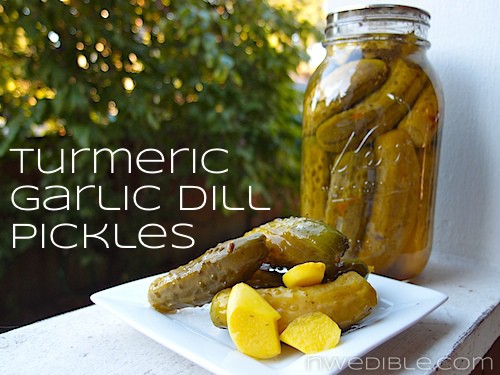
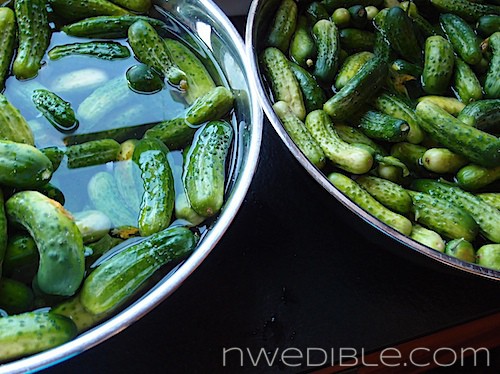
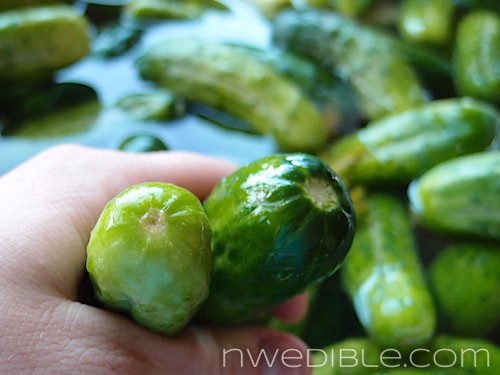
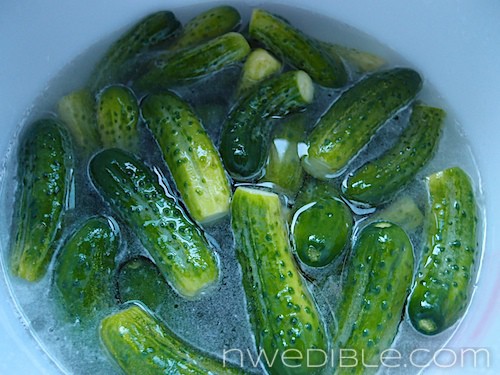
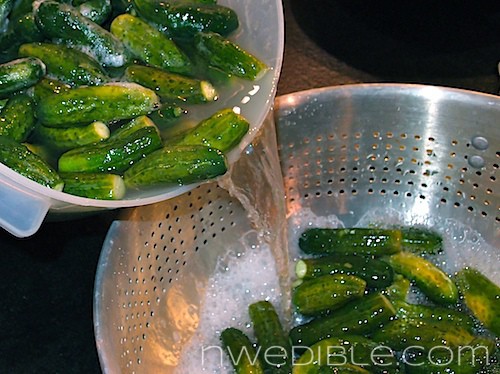
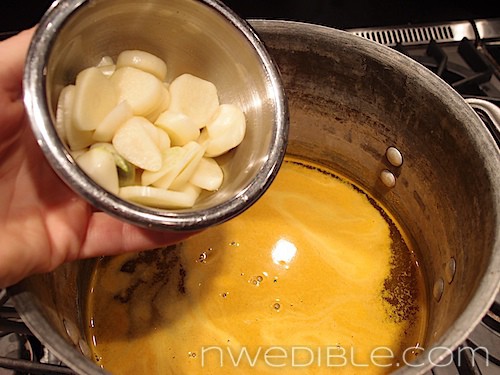
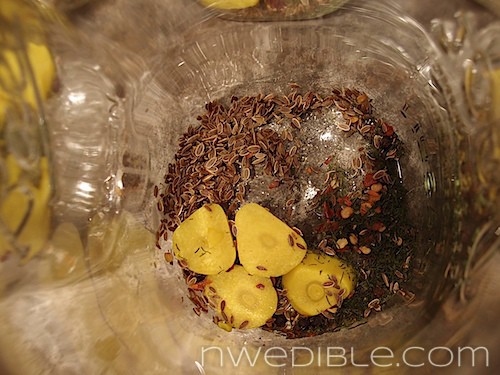
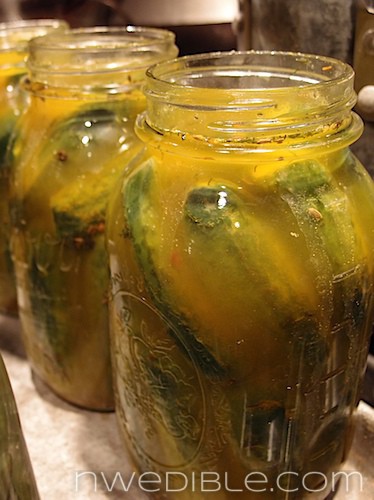
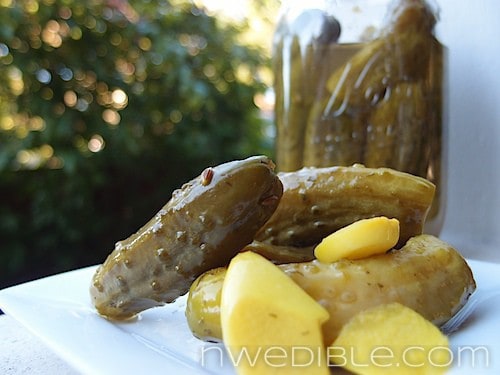
Thanks for posting the recipe. What is the purpose of the pre-soak? I see that a lot in recipes as well as pre-salting the vegetables then rinsing later. Is the purpose to draw moisture out or to season? I’m usually lazy and skip that step.
This sounds really tasty! I remember my Mother used to mix onions and garlic with the pickles, the end up tasting even better (to me) than the cucumbers! I’m going to have to try this recipe this year.
Fabulous photos!
Sounds absolutely delicious!!! Will have to file this one away for next year though – contractors are tearing my apartment apart 🙁
Yum!!! We LOVE pickles around here – I shared your Can-o-Rama post on my FB page (seriously, find me – we need to be friends!), and all my homebrewer guy buddies were like, “YAY! Hat tip to us! Finally, something we can do WITH our wives in the kitchen!” 🙂
I also complained that you made me look like a slacker. 😉 But way to go – I have more and more canning to do yet. Currently looking for a fridge for the garage so we can do some lacto-stuff and lagers as well. 😀
My first batch of these is in the water bath right now 🙂
I have a question – I found a recipe for kosher dills that doesn’t use vinegar (the author was actually quite snitty about pickles using vinegar). How are those pickles safe for consumption without the vinegar?
These are almost certainly a fermented pickle. Lacto-preserved (“brine”) pickles CAN BE perfectly safe, but it’s a different process. Read this before you do anything: http://nchfp.uga.edu/how/can_06/dill_pickles.html
I’m a big fan of brined pickles too, but there’s no need to get snitty about it. 😉 They are just different products with different applications.
Tomato…tomahto….or in this case, a pickle is a pickle is a…..
Doesn’t matter how they’re made. Pickles are awesome! I don’t understand why people have to get snitty about preserving like some people do; If you are following whatever process you’ve chosen to the letter, the food is safe. And FAR better than any damn jar from the store. 😀
Wow… so psyched to find you today!! Just finished making some apricot jam and had to figure out the label thing… (My name for this batch is… “Pure Ape” as people go ape shit over the apricot variety of jam… ) Loved your suggestions and got some labels ordered already… But.. But… But… I also have tons of asparagus (one of my many off spring, has a business delivering organic produce to some cool places along Coast Hwy 1 in California, as well as he works the farmer’s markets… so Mama gets the benefits)… want to pickle them and wonder if you’ve tried this recipe with anything other than cukes? Feeling like it may work, but would love your two cents on it.
I made this recipe a few weeks ago and they are DELICIOUS! I’d like to try making pints instead of quarts next (only because I’m trying to save my quart jars for tomatoes). Would you recommend using the same processing time for pint jars?
Excellent recipe! I’ve been trying for years to find something close to Mrs. Whyte’s Kosher Dills and this actually beats it. They have a very similar taste but are not so overpowering as to leave your mouth begging for mercy after a couple. Thanks again!
Tried making these but silly me forgot to leave good headspace, so I think all 4 quarts are destined for the fridge. Sigh.
Lots of conflicting reports on how long they stay fresh in fridge, anywhere from a month to 1-2 years. So I guess we’ll see?
Reprocessing them after so carefully fiddling with the pasteurization temp range with an electric stove would just destroy the texture.
Apparently I spoke too soon – all 4 sealed up just fine!
Can the cucumbers be quartered so that larger dukes can be used?